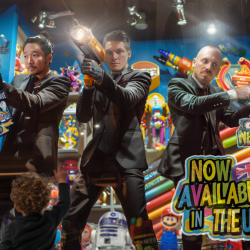A few years ago I was wandering through Berlin and came across a very unusual playground…
Berlin boasts a large number of idiosyncratic playgrounds but this one gave me pause because it looked like the children were playing with power tools without adult supervision. This turned out to indeed be the case because in the epic playground Kolle 37, children use tools to construct the playground as they like around them and parents are not allowed inside (except on one day a week.) In my memory there was a kid with a power saw and a fire burning in a metal trash can but memories are notoriously unreliable.
The playground is part of a German movement that exposes children to curated risk. Playgrounds in the USA and UK tend towards rubberized flooring and baby proofed corners designed to minimize the possibility of injury and thus lawsuits. In Germany, where they have a tradition of seriously considering play as an academic discipline, playgrounds have evolved differently. As Prof. Rolf Schwarz of Karlsruhe University of Education, who advises councils and playground designers, says “If we want children to be prepared for risk, we need to allow them to come into contact with risk.”
The thinking is that by keeping children from the possibility of harm we do them a disservice, because they don’t learn to manage risk. By keeping them safe, we make it more likely that they will hurt themselves later in life — or simply be afraid of anything and everything. Remarkably, this initiative is officially supported by the trade association of German insurance companies because of a 2004 study that found children who had improved their motor skills in playgrounds at an early age were less likely to suffer accidents later in life. Thus the association called on playgrounds to help children develop ‘risk competence’.
Insurance, like finance and business in general, is about risk competence. The greater the risk, the greater the potential rewards, because all investment is speculative. Businesses understand and attempt to manage risk within certain tolerance thresholds. Some companies are more conservative whereas venture funded companies are often less risk averse, sometimes too much so. The now disgraced CEO of bankrupt cryptocurrency exchange FTX recently suggested that perhaps this was part of its downfall, saying “There is something maybe even deeply wrong there, which was I wasn’t even trying. Like, I wasn’t spending any time or effort trying to manage risk on FTX and that, that was obviously a mistake.” If you are a financial company and have not even considered risk management, yes, that would be considered an obvious mistake.
A classic comment from a creative director leaving a review is to “push the work further”. We have a lot of conversations with clients and agencies about creative effectiveness and the topic of bravery comes up a lot. Agencies want to push their clients to commission ‘brave’ advertising that will cut through, clients want work that drives business results without any threats to brand safety. For something to be brave means there is inherent risk involved so we always ask: what risks are you willing to take?
It is worth remembering that if you’re the agency pushing for ‘brave’ work, it’s the client that’s taking all the risk. It’s their budget and ultimately their job on the line if they buy an idea that somehow flops or causes a scandal they weren’t intending.
If agencies want clients to take risks, it’s only fair to ask what risk the agency is willing to take in return. I don’t mean accepting 360-day payments terms or anything else that will actively cripple a business, destroy the working relationship and lose people their jobs. But if agencies want clients to be brave, then they should consider if they have any skin in the game. Agencies should appreciate the risk competence that clients have had to develop. Agencies have not had the need or opportunity to develop risk competence in the same way. Agencies play in different playgrounds, making innumerable ads with other people’s money but many clients can only make a few a year, if that, and that’s their whole budget. If it fails to show results, that’s their job.
Luxury brand Balenciaga thought it was being edgy with its recent photoshoot, taking on some risk to gain salience, but the disturbing elements and the scandal that emerged means that the client is now suing the agency/production company for $25M.
This potentially sets an interesting precedent. If agencies are held liable for costs associated with the fallout from ‘brave’ work, will they still be so keen to sell it?
Featured image: Altered Snaps / Pexels



























